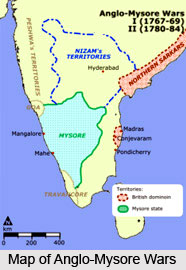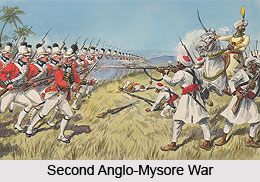 Anglo-Mysore wars are a series of wars fought in the last three decades of the eighteenth century between the kingdom of Mysore and the British East India Company. The Madras Presidency chiefly represented this series of wars. The consequence of the war was vital as it resulted in the overthrow of Hyder Ali and Tipu Sultan who were killed in the final war in the year 1799. It also led to the disintegrated of Mysore to the benefit of pro-British allies. The first of the Anglo-Mysore wars saw the mighty Hyder Ali inflicting crushing defeats on the combined armies of the Marathas, the British and the Nizam of Hyderabad. The second Anglo-Mysore war witnessed the rise of Tipu Sultan as a mighty political leader. During the third Anglo-Mysore war the state of Mysore was attacked from all the four corners and the last war saw the collapse of the kingdom of Mysore. Following the Battle of Palashi in 1757 and the Battle of Buxar in 1764, both of which established the British dominion over East India, the Anglo-Mysore wars along with the Anglo-Maratha wars consolidated the British claim over South Asia further resulting in the establishment of the British colonial rule in the Indian subcontinent.
Anglo-Mysore wars are a series of wars fought in the last three decades of the eighteenth century between the kingdom of Mysore and the British East India Company. The Madras Presidency chiefly represented this series of wars. The consequence of the war was vital as it resulted in the overthrow of Hyder Ali and Tipu Sultan who were killed in the final war in the year 1799. It also led to the disintegrated of Mysore to the benefit of pro-British allies. The first of the Anglo-Mysore wars saw the mighty Hyder Ali inflicting crushing defeats on the combined armies of the Marathas, the British and the Nizam of Hyderabad. The second Anglo-Mysore war witnessed the rise of Tipu Sultan as a mighty political leader. During the third Anglo-Mysore war the state of Mysore was attacked from all the four corners and the last war saw the collapse of the kingdom of Mysore. Following the Battle of Palashi in 1757 and the Battle of Buxar in 1764, both of which established the British dominion over East India, the Anglo-Mysore wars along with the Anglo-Maratha wars consolidated the British claim over South Asia further resulting in the establishment of the British colonial rule in the Indian subcontinent.
First Anglo-Mysore war
This war was fought in India in the period of 1766 to 1769 between the kingdom of Mysore and Great Britain. After Hyder Ali began to occupy the attention of the British government in Madras and entered into an agreement with the Nizam to provide troops to fight against the common enemy but unfortunate the superior British training and military disciple prevailed in the Battle of Changam and also in that of Tiruvannamalai. But in the end under his compulsion, the treaty of April 1769 was signed thus providing the mutual restitution of all conquests and for mutual aid and alliance in the defensive war.
Second Anglo-Mysore war
The Second Anglo-Mysore war was fought between the spans of 1780-1784. The war rose initially from the internal conflict with the Maratha confederacy. Hyder Ali wholeheartedly committed to the French alliance to fight against the British but the latter became resolved to drive the French out of India. The British captured the Malabar Coast in the year 1779 and also annexed certain territory, which was in the possession of a dependent of Hyder. It is this particular time which witnessed the growth of Tipu Sultan, the eldest son of Hyder Ali as a great warrior and political leader.
Third Anglo-Mysore war
During the third war, Tipu Sultan invaded the state of Travancore in the year 1789 and the consequence of this war was the defeat for Mysore. The French alliance did not prove to be beneficial enough as embroiled in the French Revolution and thwarted by the British naval power they could provide Tipu much aid. The war ultimately resulted in the sharp curtailment of all the border of the Mysore kingdom.
Fourth Anglo-Mysore war
The fourth war was of very short duration and decisive in nature. Tipu Sultan was defeated by Stuart at Sedaseer and was subsequently killed thus resulting in the collapse of a leading Indian power and also one of the most inveterate foes of the British monarchy. After this war the English rulers took indirect control of the kingdom of Mysore and restored the Hindu Wodeyar dynasty to the Mysore throne after signing a subsidiary alliance. This war in fact destroyed the whole of the Mysore kingdom.



















